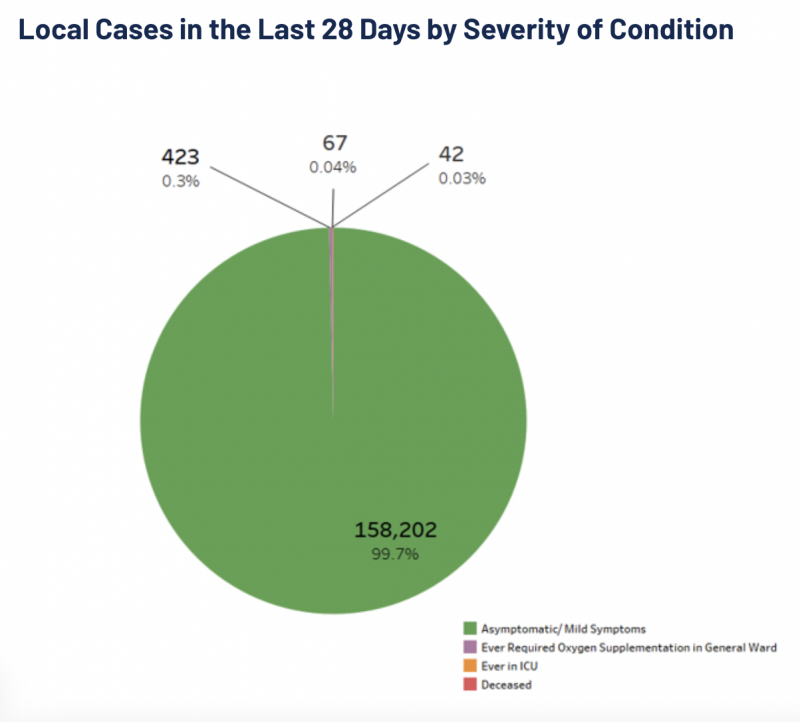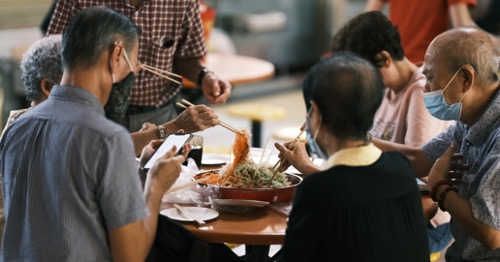Follow us on Telegram for the latest updates: https://t.me/mothershipsg
We're coming up on the third year of this accursed pandemic, but could there be some light at the end of the tunnel?
Health Minister Ong Ye Kung gave a quick doorstop interview on Feb. 12, discussing the recent surge in Omicron-related Covid-19 cases.
Good news soon?
Daily Covid-19 cases have been recorded over the 10,000 mark on several occasions, including on Feb. 12.
However, Ong said it's "not unexpected" due to Omicron's high transmissibility, and the more important factor is the impact on Singapore's healthcare capacity.
"So far, despite the big number of people going to GPs, many of them (have) mild or no symptoms," he said, adding that Omicron is very different from the Delta variant, and "much less serious".
At the end of the interview, Ong said that the authorities will hold a press conference "very soon", to which a reporter asked, "Is it good news?"
Ong just smiled and said, "I will elaborate more later".
Countries around the world easing restrictions
If you've been paying attention to developments around the world, there are signs of eased restrictions in other countries, despite the high case numbers caused by the Omicron variant.
From Denmark:
To Sweden:
France:
And Norway:
Closer to home, Malaysia is also mulling easing Covid restrictions:
The reasons given are similar and familiar:
- The Omicron variant is less deadly than Delta and preceding variants, despite its high transmissibility.
- The healthcare systems in those countries have been judged sufficient to cope, even with more cases.
- A relatively high vaccine coverage of the population was crucial in ensuring the healthcare system isn't overwhelmed.
Let's take Norway, for example. At the time of the announcement, it had 73 per cent of the eligible population having received at least two doses of a Covid-19 vaccine, with about half having received a booster.
Now let's look at Singapore.
 Screenshot from MOH.
Screenshot from MOH.
Like true Singaporeans, we've managed to get a "A" grade when it comes to vaccine coverage.
Of course, it isn't a one-to-one comparison. Singapore is a densely populated city-state, unlike other countries.
But if one looks at the big picture, it seems apparent that Singapore is an excellent candidate for easing Covid restrictions, if not lifting them entirely.
The local situation
It isn't just other countries. Local experts have been making the case that at the very least, additional restrictions are unnecessary despite the spike in Covid cases.
Following Chinese New Year and the large jump recorded on Feb. 4 with over 13,000 cases, the experts urged the public to remain calm and instead look at numbers like hospitalisations and cases in the intensive care unit (ICU), as better indicators of the situation.
According to Dale Fisher of National University Hospital and speaking to the Straits Times:
"The trigger for an increase in social restrictions should be severe disease. This Omicron wave needs to run its course so while the numbers look scary, we should focus on ICU cases, which is currently one-tenth of what it was a few months ago."
Other experts have chimed in, specifically identifying Singapore's excellent position and advantages should it choose to ease restrictions further.
Why ease restrictions?
Covid-19 doesn't just affect the human body, but the mind as well.
Prolonged and severe restrictions cause "pandemic fatigue", with loneliness, social withdrawal, and stress all taking its toll.
And because this is Singapore, the economy has to be considered too.
The impact of restrictions on businesses have been severe, as visitor caps, isolation protocols and border restrictions have affected everything from the food and beverage to construction to tourism to the nightlife sectors.
Back in July 2021, business leaders urged the government to look at "adverse medical outcomes" instead of the overall case numbers when deciding whether or not to tighten restrictions.
Small businesses, especially those in the retail sector, have been "suffering" since the beginning of the pandemic.
New treatments for Covid have been made available, and could prove a critical countermeasure to illness.
It seems clear that with conditions as they are, tightening restrictions is not the way to go, and some easing can be considered.
When and how should we do it?
But if we are to ease restrictions, when exactly should we do it?
Speaking to Mothership, Leong Hoe Nam said he expects restrictions to ease when the number of new cases slows down.
Leong, an infectious diseases specialist at Mount Elizabeth Novena Hospital, said we should look out for the infection ratio to fall "consistently" below 1.0.
"With that, we should see an easing of the primary care services and emergency department. At this current rate, our hospital and ICU services should still be adequate. So the determining factor will be the primary care services," he said.
As of Feb. 12, the weekly infection growth rate is 1.54, which is lower than the 1.74 recorded the day before, so it looks like we're heading in the right direction.
Local cases in the past 28 days are also overwhelmingly asymptomatic or report only mild symptoms, which means less pressure on the healthcare system and its workers.
 Screenshot from MOH
Screenshot from MOH
But Ong and other government officials have also made one thing clear -- we are not going back to 2019, nor will Singapore completely lift all restrictions, as the UK is planning to do.
There will be some restrictions that will have to remain in place, even given Omicron's relative tameness.
Not only will they help to reduce the number of infections, it will also be safer for the immunocompromised and elderly people in society.
What should go and what should stay?
According to Leong, he expects restrictions on dining to be eased, and also the current ban on the sale of alcohol after 10:30pm to be ended.
Such an announcement would be a relief to our badly hit F&B and entertainment sectors.
Leong also suggested that we could see travel open up, with Vaccinated Travel Lanes opened to all willing countries.
We can also expect large-scale, outdoor activities to have eased restrictions, as the risk of infection is much lower in the outdoors, due to better ventilation.
Something along the lines of France's lifting on mask restrictions outdoors could also be mooted, although it's likely that many Singaporeans will continue wearing them anyway.
Perhaps we'll resemble the Japanese in this manner, where mask-wearing on the daily commute is seen as nothing out of the ordinary.
As the danger to unvaccinated and otherwise at-risk individuals remains, with about 70 per cent of Covid-related deaths in 2021 made up of unvaccinated individuals, restrictions may still apply to them.
Mandatory testing before visiting elderly relatives in a care home, for example, seems like a sensible precaution.
Who knows, we may even see testing before social activities as a new rule of etiquette.
But one thing remains clear -- due to the efforts of everyone, healthcare workers, the public, the authorities, Singapore is in an excellent position to manage the Omicron wave, and has good reasons to ease restrictions.
And as Ong's wry answer in his doorstop interview hinted, this could come sooner rather than later.
Related story:
Top image by Galen Crout via Unsplash.
Follow and listen to our podcast here
If you like what you read, follow us on Facebook, Instagram, Twitter and Telegram to get the latest updates.
